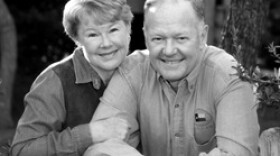In the last two years, several domestic violence cases in North Texas have made national headlines. In one, a Dallas woman was strangled while seeking help from a 911 operator. In another, a woman was killed by her estranged husband before his scheduled arrest. The Dallas Police Department has since made changes within its domestic violence unit.
Dallas police Lt. Miguel Sarmiento doesn’t sound like a police officer; he sounds more like a therapist.
“Love isn’t breaking somebody’s arm,” Sarmiento said. “Love isn’t choking them. Love isn’t putting a gun to their heads. Or threatening to kill their kids.”
Growing up in South Texas, Sarmiento says his own family wasn’t immune to domestic violence. And that experience has shaped how he runs the unit, which now has 34 detectives, up from 21 just two years ago.
“The challenge for everybody is how do we keep that person safe between the day they filed that report to the day that their abuser gets his sentence," Sarmiento said.
It takes a community effort, he says, and that’s why he’s already done nearly 90 talks in the Dallas area this year. There’s also new technology, and fresh blood in the department. More than half of the previous unit’s staff either retired or transferred out.
Abuse victims are likely to notice a new way that detectives are talking, using LAP, a lethal assessment program.
“There’s a series of questions,” Sarmiento said. “We encourage them ... we try to get them resources immediately there. So from the perspectives of the complainant, I think they are seeing more support from us. And it really doesn’t matter whether the officer believes what he’s doing. What matters is that the complainant knows that we’re helping them, doing more for them.”
Gene-hari Allen isn’t from Texas. But the 34-year-old has family in Dallas, so she traveled here with her two young boys, from the East coast to find a job. She found that -- and a boyfriend.
“I’ve had angry boyfriends in the past, but never ever anything like this,” Allen said. “This was the first experience where I was trying to be with someone who was in fact dangerous.”
Allen says she didn’t realize her then-boyfriend was in a gang, and that he had a violent past.
“I knew the guy when I first moved down here, for about six months, and then we stayed with him for about two months,” she said. “And he tried to choke me three times. It really wasn’t in front of my boys because I believe they were sleeping. But I think they heard most of it.”
The physical abuse got so bad she finally called the Dallas police.
"The people on the phone tried to keep me calm,” Allen said. “When the police officers arrived, they told me about the different resources, numbers I could call, to like get away from him, to get the protective order. They had him served quickly. I feel like the process went pretty fast.”
Allen said she feels the police were helpful. She now lives in a safe house. The man she once loved, the one who strangled her three times, is in jail.
Another woman, Denise, who declined to use her real name, says her experience with the police was different.
“My experience with the police, before this, I would say, it was very unpleasant, very awful," Denise said.
She’s called the police in years past, to report abuse by her husband, but often felt worse after the call.
“At times, they’d make me feel like I was the one, like I was the one in the wrong,” Denise said. “My husband was very abusive, physically, mentally, financially.”
Both these women were helped by the Texas Muslim Women’s Foundation. Hind Jarrah, the group's executive director, says the challenge is complex.
“There are so many layers when you are dealing with all these different cultures,” Jarrah said. “And with all these different faith communities, it will take help from within the community to lead to the long-term solutions.”






